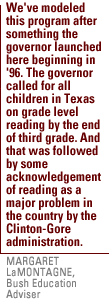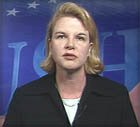
 If there is a core claim that distinguishes every ED response to the emerging Reading First criminal conspiracy, it is that Margaret Spellings came on the scene long after most of the dastardly deeds were committed by Doherty, who has now been selected as the "Michael Brown" to be sacrificed in this debacle. Too bad that this core story line is another lie: Margaret LaMontagne (Spellings) was Bush's chief domestic policy advisor before she became Secretary of Education, and in 2000 she was spokesperson for Reading First and education advisor even before Bush was appointed President, when she and Lyon and Carnine's Oregon mafia built the infrastructure for the crackpot con game that would become the Reading First we now know about. On March 29, 2000 Margaret Warner had the story:
If there is a core claim that distinguishes every ED response to the emerging Reading First criminal conspiracy, it is that Margaret Spellings came on the scene long after most of the dastardly deeds were committed by Doherty, who has now been selected as the "Michael Brown" to be sacrificed in this debacle. Too bad that this core story line is another lie: Margaret LaMontagne (Spellings) was Bush's chief domestic policy advisor before she became Secretary of Education, and in 2000 she was spokesperson for Reading First and education advisor even before Bush was appointed President, when she and Lyon and Carnine's Oregon mafia built the infrastructure for the crackpot con game that would become the Reading First we now know about. On March 29, 2000 Margaret Warner had the story:MARGARET WARNER: Bush calls his program "Reading First." It would spend $1 billion a year to do the following:
- Help states develop and administer diagnostic tests to identify which kindergarten and first-grade students need special reading help
- Subsidize special training for kindergarten and first-grade teachers in reading instruction, using research- tested methods such as phonics
- And, subsidize intervention programs for the students who need help including tutors, after-school programs, and summer school.
Schools receiving the federal money would be required to adopt all these elements, and would be held accountable for the results. . . .
MARGARET WARNER: For more on Bush's plan, we're joined by Margaret LaMontagne, Governor Bush's education adviser, and William Galston, senior policy adviser for Vice President Gore and a professor at the School of Public Affairs at the University of Maryland. Welcome, both of you.
Ms. LaMontagne, first of all give us a few more details on this plan. How many students? The handout from the campaign talked about 900,000 students. Is that the scope of the problem? Is that how many students can't read at the grade level in those grades? And would this fully address it?
MARGARET LaMONTAGNE, Bush Education Adviser: Well, that's a good estimate and a good start. I mean, I think one of the things about trying to derive a number about how many kids are really in need of special help to be readers -- because we know that if kids are not on track to be readers by the end of third grade, the likelihood is very high that they won't ever be and that they'll not be able to succeed in school or in life. And so it's a game that's fought and won early.
But one of the things I think about the number is that it speaks to the need for more accountability, more data, but we do believe that approximately 900,000 children would need special assistance to make sure that they're on track to be readers. We've modeled this program after something the governor launched here beginning in '96. The governor called for all children in Texas on grade level reading by the end of third grade. And that was followed by some acknowledgment of reading as a major problem in the country by the Clinton-Gore administration. This is a plan that's developed on a successful model that we've used here in Texas.
What else was Reading First spokesperson and education advisor, Lamontagne-Spellings, talking about that evening in 2000? No Bush plan would be complete without a plan to destroy the public schools with vouchers. Over to you, Margaret and Margaret:
MARGARET WARNER: So, under the governor's plan though, if a school was in this program and after two or three years not many of their students were reading a lot better, what would happen?MARGARET LaMONTAGNE: We would allow portability and up to $1500 per child to be matched by the state and to flow to the parents so that they could make a difference choice. I think what the governor laid out yesterday that expands on his previous proposal is that we're willing to put some skin in the game to make sure that we have as few kids as possible portable but at some point in time we have to say, if kids are not getting opportunities in public schools, then they need options.
AYP has always been a device to manufacture the failure necessary to usher in vouchers. For Spellings to deny innermost knowledge of what was going on at ED before she was promoted to Secreatary is just as believeable as any other lie emanating from the failed government in the White House.
Update7:40 pm:
And who was named to direct the expert policy group that would stage the transition at ED in January, 2001? You guessed it, same Margaret who now pretends to be out of the loop when the ED corruption mold was poured. Check out this list: Can you guess how many have already been exposed as crooks? (pdf) Washington Education News January 18, 2001 (January 17-18, 2001:
Transition Team
President-elect Bush has appointed a 31-member advisory group to assist Secretary nominee Paige in his transition to USDE. The group is to provide input and related outreach for the policy coordination group appointed earlier. The group includes Lamar Alexander (former USDE Secretary), Norman Augustine (Lockheed Martin), Keith Bailey (Williams Companies), Frank Brogan (Lt. Gov. of Florida), John Chambers (Cisco Systems), Sharon Darling (national Center for Family Literacy), Williamson Evers (Hoover Institution), Chester Finn (Fordham Foundation), Floyd Flake (Edison Schools), Howard Fuller (Institute for the Transformation of Learning), Lisa Graham Keegan (Chief in Arizona), Gene Hickok (chief in Pennsylvania), Phyllis Hunter (Texas Reading Initiative), Robert King (State University of New York), Reid Lyon (NIH), Mitch Maidique (Florida International University), Bruno Manno (Annie E. Casey Foundation), John McKernan (former governor of Maine), Charles Miller (Meridian Advisors, Ltd.), Darla Moore (Rainwater, Inc.), Lynne Munson (American Enterprise Institute for Public Policy), Diana Natalicio (University of Texas-El Paso), Susan Neuman (Center for Improvement of Early Reading Achievement), Hugh Price (National Urban League), Diane Ravitch (New York University), Ed Rust (State Farm Insurance), Ted Sanders (Education Commission of the States), Andrew Sorenson (University of Alabama), Paul Vallas (Chicago Public Schools), Maris Vinovskis (University of Michigan) and Mark Yudof (University of Minnesota).
The policy experts named by Bush are: Margaret LaMontagne (Bush’s senior education advisor in Texas), who will direct the group; Sandy Kress (attorney and former president of the Dallas school board), as the chief adviser; William Hansen (Education Finance Council); Sarah Youssef (from the campaign, formerly with the Heritage Foundation); Christine Wolfe (staff of the House Education and Workforce Committee); Becky Campoverde (same); and Nina Shokraii Rees (Heritage Foundation).
No comments:
Post a Comment